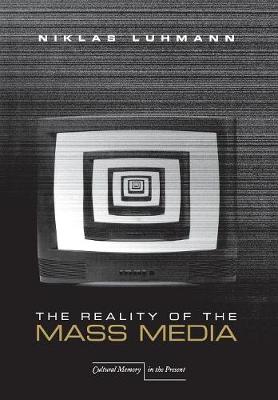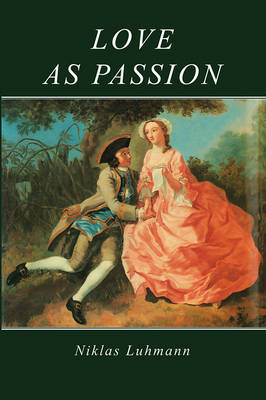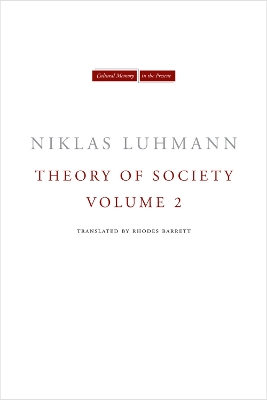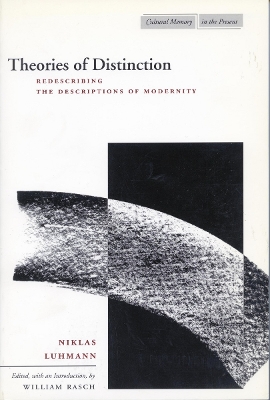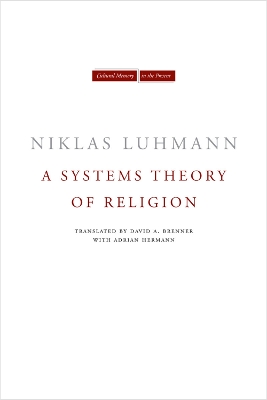Cultural Memory in the Present
5 total works
It forms a broad reservoir (memory) of options for the future coordination of action, and it provides parameters for the stabilization of political reproduction of society, as it produces a continuous self-description of the world around which modern society can orient itself. In his discussion of mass media, Luhmann elaborates a theory of communication in which communication is seen not as the act of a particular consciousness, nor the medium of integrative social norms, but merely the technical codes through which systemic operations arrange and perpetuate themselves.
This classic book by Luhmann has been widely recognized as a work of major importance. It is an outstanding contribution to social theory and it provides an original and illuminating perspective on the nature of modern marriage and sexuality.
This second volume of Niklas Luhmann's two-part final work was first published in German in 1997. The culmination of his thirty-year theoretical project to reconceptualize sociology, it offers a comprehensive description of modern society. Beginning with an account of the fluidity of meaning and the accordingly high improbability of successful communication, Luhmann analyzes a range of communicative media, including language, writing, the printing press, and electronic media, as well as "success media," such as money, power, truth, and love, all of which structure this fluidity and make communication possible. The book asks what gives rise to functionally differentiated social systems, how they evolve, and how social movements, organizations, and patterns of interaction emerge. The advent of the computer and its networks, which triggered potentially far-reaching processes of restructuring, receives particular attention. A concluding chapter on the semantics of modern society's self-description bids farewell to the outdated theoretical approaches of "old Europe"—that is, to ontological, holistic, ethical, and critical interpretations of society—and argues that concepts such as "the nation," "the subject," and "postmodernity" are vastly overrated. In their stead, "society"—long considered a suspicious term by sociologists, one open to all kinds of reification—is defined in purely operational terms. It is the always uncertain answer to the question of what comes next in all areas of communication.
The essays in this volume by Germany's leading social theorist of the late twentieth century formulate what he considered to be the preconditions for an adequate theory of modern society.
The first two essays deal with the modern European philosophical and scientific tradition, notably the ogy of Edmund Husserl. The next four essays concern the crucial notion of observation as defined by Luhmann. They examine the history of paradox as a logical problem and as a historically conditioned feature of rhetoric; deconstruct the thinking of Jacques Derrida, especially his language-centered allegiances; discuss the usefulness of Spencer Brown's Laws of Form; and assess the consequences of observation and paradox for epistemology.
The following essays present Luhmann's theory of communication and his articulation of the difference between thought and communication, a difference that makes clear one of Luhmann's most radical and controversial theses, that the individual not only does not form the basic element of society but is excluded from it altogether, situated instead in the environment of the social system. The book concludes with a polemic against the critical thought of the Frankfurt School of postwar German social thought.
A Systems Theory of Religion, still unfinished at Niklas Luhmann's death in 1998, was first published in German two years later thanks to the editorial work of André Kieserling. One of Luhmann's most important projects, it exemplifies his later work while redefining the subject matter of the sociology of religion. Religion, for Luhmann, is one of the many functionally differentiated social systems that make up modern society. All such subsystems consist entirely of communications and all are "autopoietic," which is to say, self-organizing and self-generating. Here, Luhmann explains how religion provides a code for coping with the complexity, opacity, and uncontrollability of our world. Religion functions to make definite the indefinite, to reconcile the immanent and the transcendent.
Synthesizing approaches as disparate as the philosophy of language, historical linguistics, deconstruction, and formal systems theory/cybernetics, A Systems Theory of Religion takes on important topics that range from religion's meaning and evolution to secularization, turning decades of sociological assumptions on their head. It provides us with a fresh vocabulary and a fresh philosophical and sociological approach to one of society's most fundamental phenomena.
